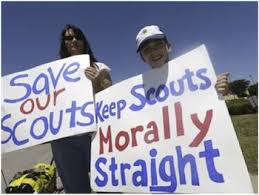I was slightly less disturbed by the Boy Scouts of America’s new membership policy after reading it in the context of its preamble. While the new policy specifies that no youth may be denied membership because of sexual orientation or preference alone, the preamble insists that: “Scouting is a youth program, and any sexual conduct, whether homosexual or heterosexual, by youth of Scouting age is contrary to the virtues of Scouting.”
 Bingo. These are, after all, children, whose “sexual orientation” and “sexual preference” we are expounding, and BSA is right to recognize that any sexual conduct by youth is unacceptable.
Bingo. These are, after all, children, whose “sexual orientation” and “sexual preference” we are expounding, and BSA is right to recognize that any sexual conduct by youth is unacceptable.
The thoughtful observer is left, then, to wonder: what is the purpose of the policy change?
If it is meant to ensure that no boy is excluded from scouting simply because he is less masculine in appearance, gait, voice, or athletic acumen than the average Tom, Dick, or Harry, then it is a good thing. No one should be excluded on the basis of innate characteristics over which he has no control. That is a form of discrimination which is mean-spirited and unjust, and it is right for BSA to prohibit it.
I am encouraged by the statements on BSA’s website recognizing this critical distinction between identity and actions. In other words, a boy who may allegedly feel “attracted” to other boys can still be a scout, but a boy who acts on that attraction (or on opposite-sex attraction, for that matter) by engaging in sexual conduct cannot.
This is a noble and appropriate position in that it manifests appropriate compassion for kids while preserving moral integrity. Each of us struggles with our own temptations, yet hopes to find grace and acceptance as we struggle. It is when we yield to our temptations and embrace them as our intended way of life that love demands the toughness of a hard line. There are few aspects of one’s identity, nature or feelings that can be controlled, but actions surely can and should be restrained and guided by moral instruction.
What continues to gnaw at me, however, is the awareness that a society bent on erasing the idea of “wrong” will not be sated by this kind of position. For instance, the public discussion about the need for acceptance of boys who are “openly gay” suggests that “tolerance” requires scout leaders to yield the floor to boys who choose to discuss their sexual urges openly (or at least if those urges are same-sex in nature).
This would be at odds with the BSA’s explicit statements that it does not intend to permit the sexualization of scouting. If BSA’s policy is interpreted by leaders to obliterate the value of sexual purity—which, at this age, means chastity–then this noble organization will lose valuable acreage of moral high ground that benefits all boys, whatever their feelings or inclinations.
The policy is also troubling because any effort to suggest to (or teach?) scouts that homosexual activity is a “morally straight” option creates an irreconcilable conflict for many with the fulfillment of the scout oath to do one’s “duty to God.” The God of the Bible has condemned the practice of homosexuality in no uncertain terms, and BSA should refuse to attempt the impossible task of reconciling Holy Scripture with the new cultural “norm.”
Such mediation efforts will not produce more enlightened, caring men; they will, if successful, produce men who die of thirst in a desert of moral relativism. How cruel it would be to insist that scouts be “morally straight” while denying the existence of a plumb line.
C.S. Lewis aptly lamented, “We make men without chests and expect from them virtue and enterprise.” My hope is that Boy Scouts of America may yet help men to find their chests. That doesn’t mean tolerating the bullying or exclusion of boys who are different or struggling. It does mean holding fast to the distinction between accepting people and approving of their behavior.
Rita Dunaway, Virginia Christian Alliance Vice President for Public Policy, also writes on her blog Fundamental Things.




